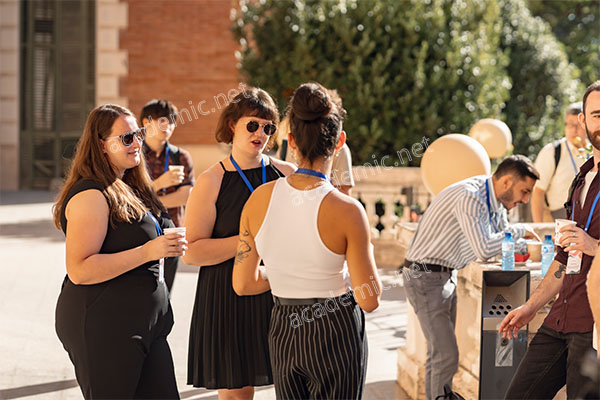How to Ask Questions at Academic Conferences: A Professional Guide
Asking questions at academic conferences is a valuable skill that can enhance your learning, spark meaningful discussions, and help you connect with experts in your field. However, asking questions effectively requires preparation and tact. This guide offers practical tips on how to ask insightful, professional questions that contribute to the discussion and make a positive impression on both the speaker and the audience.

1. Understand the Presentation First
Before you ask a question, it’s essential to fully understand the presentation to ensure your question is relevant and thoughtful.
- Listen Actively: Pay close attention to the speaker's main points, methodology, and conclusions. Take notes on areas that interest you or seem unclear.
- Focus on Gaps or Ambiguities: Identify parts of the presentation where more information could enhance your understanding, such as unclear data points or unexplained assumptions.
- Avoid Premature Judgments: Reserve forming opinions until the speaker has finished their talk to avoid asking a question that might already be addressed later.
Thorough understanding ensures your question is informed and meaningful, showing respect for the speaker's work.
2. Formulate Your Question Thoughtfully
A well-crafted question is clear, concise, and relevant to the topic being discussed.
- Be Specific: Focus on a particular aspect of the presentation rather than asking vague or overly broad questions. For example, instead of asking, "Can you elaborate on your findings?" ask, "How do you interpret the correlation between variable X and outcome Y in your results?"
- Keep It Concise: Avoid lengthy preambles or overly complex phrasing. A brief introduction to your question, followed by the question itself, is sufficient.
- Frame It Constructively: Phrase your question to encourage discussion rather than confrontation. Use polite language, such as, "Could you clarify..." or "I’m curious about..."
Clear and constructive questions contribute positively to the discussion and show professionalism.
3. Time Your Question Appropriately
Timing is crucial when asking questions at conferences.
- Wait for the Q&A Session: Most conferences allocate time for questions at the end of a presentation. Avoid interrupting the speaker during their talk unless explicitly invited to do so.
- Be Mindful of Others: If many attendees want to ask questions, limit yourself to one question and keep it brief to allow others the opportunity to participate.
- Observe Audience Reactions: If a similar question has already been asked, consider modifying or reframing your question to avoid redundancy.
Proper timing ensures that your question is well-received and demonstrates respect for the conference format and other attendees.
4. Show Respect and Professionalism
How you ask your question can significantly impact how it is received.
- Address the Speaker Respectfully: Use their title (e.g., Dr., Professor) or refer to them by name if appropriate. Acknowledge their effort and expertise with phrases like, "Thank you for your insightful presentation."
- Avoid Criticism or Confrontation: Even if you disagree with a point, frame your question to promote discussion rather than challenge the speaker. For example, instead of saying, "I think your methodology is flawed," say, "Could you elaborate on why you chose this specific methodology?"
- Maintain a Neutral Tone: Speak calmly and professionally, avoiding sarcasm or overly emotional language.
Respectful questioning fosters a positive academic environment and leaves a favorable impression.
5. Ask Open-Ended Questions
Open-ended questions encourage detailed responses and meaningful dialogue.
- Avoid Yes-or-No Questions: Instead of asking, "Did you consider X?" ask, "How did you approach considering X in your study?"
- Encourage Elaboration: Use phrases like "Can you explain further..." or "What are your thoughts on..." to invite a more in-depth discussion.
- Focus on Broader Implications: Questions that explore the broader context or potential applications of the research often lead to engaging discussions. For example, "How do you see your findings influencing future research in this field?"
Open-ended questions demonstrate intellectual curiosity and encourage productive academic dialogue.
6. Engage with the Response
Once your question has been answered, showing engagement and appreciation can help you build rapport with the speaker.
- Listen Attentively: Pay close attention to the speaker’s response without interrupting.
- Follow Up If Appropriate: If time permits, you can ask a brief follow-up question to clarify or expand on their response.
- Express Gratitude: Conclude with a polite acknowledgment, such as, "Thank you for clarifying that," or "I appreciate your detailed response."
Active engagement shows respect and interest, strengthening your professional interactions.
7. Practice Asking Questions
If you’re new to academic conferences or feel nervous about asking questions, practice can help build your confidence.
- Rehearse in Advance: Write down potential questions you might ask based on the conference topics or abstracts. Practice phrasing them clearly.
- Seek Feedback: Discuss your questions with colleagues or mentors before the event to refine them.
- Start Small: Begin by asking questions in smaller or informal sessions to gain confidence before larger conferences.
With practice, you’ll feel more comfortable contributing to discussions at academic events.
Conclusion
Asking questions at academic conferences is a skill that can enhance your professional development and enrich your conference experience. By understanding the presentation, crafting thoughtful questions, and engaging respectfully, you can make a positive impression and foster meaningful academic discussions. Whether you’re a student or a seasoned researcher, these tips will help you contribute effectively to the intellectual exchange at any conference.
For more tips on succeeding at academic conferences, visit academic.net.
Call to Action
Ready to make an impact at your next academic conference? Start practicing your questioning skills today and prepare to engage with experts in your field. Visit academic.net for more resources and advice on academic success!
